JERUSALEM — Even in a spot so timeless that it typically appears the stones themselves are telling previous, previous tales, a single week can change every little thing.
On Friday, because the Jewish Sabbath was about to fall, and as Muslims marked their principal prayer day, Israelis and Palestinians alike struggled to return to phrases with the terrifying new actuality created by Saturday’s devastating cross-border strike by the Palestinian militant group Hamas.
“There aren’t any phrases, no phrases in any respect, no phrases for this horror,” mentioned Eliram Kalif, a 36-year-old father of three from Nir Am, a kibbutz close to the Gaza Strip.
His was one among a string of small southern Israeli communities focused by Hamas, together with a sprawling all-night dance get together that, fatefully, had drawn 1000’s of younger Israelis to the desert close to Gaza.
Within the aftermath of the militants’ onslaught, a whole lot of Israeli civilians — infants and kids, the younger and the aged, complete households — lay useless in properties and fields and in bullet-pocked vehicles on highways; scores extra have been dragged into Gaza as captives, creating an unprecedented hostage disaster in a rustic that has historically gone to huge lengths to free even a single Israeli in enemy fingers.
The daddy of French-Israeli soldier Eli Valentin Ghenassia, who was killed in fight at Kibbutz Beeri throughout an infiltration by Hamas militants, mourns throughout his funeral within the Mount Herzl cemetery in Jerusalem.
(Ronaldo Schemidt / AFP through Getty Photos)
Within the three-quarters of a century that Israel has existed, the state has by no means suffered such a staggering lack of civilian life in so brief a time, dwarfing already grave army losses within the assault.
By day’s finish Friday, the Israeli toll stood at greater than 1,300, the nice majority of them civilians.
For Palestinian civilians residing within the crowded confines of sealed-off Gaza, the long-standing grind of day by day hardship has been overshadowed by an Israeli aerial assault that army observers termed exceptional in scope and scale — bombardment that’s seen as a possible prelude to a full-scale Israeli floor invasion of the slim coastal enclave.
“After I look outdoors now, I can’t inform if what I’m was a avenue, or a constructing,” mentioned Gaza poet Mosab Abu Toha, talking by cellphone as heavy blasts echoed within the background. “The complete topography has modified.”
Israel has vowed to eradicate Hamas. However the militants are embedded in neighborhoods the place strange individuals dwell, and civilians are paying the heaviest value.
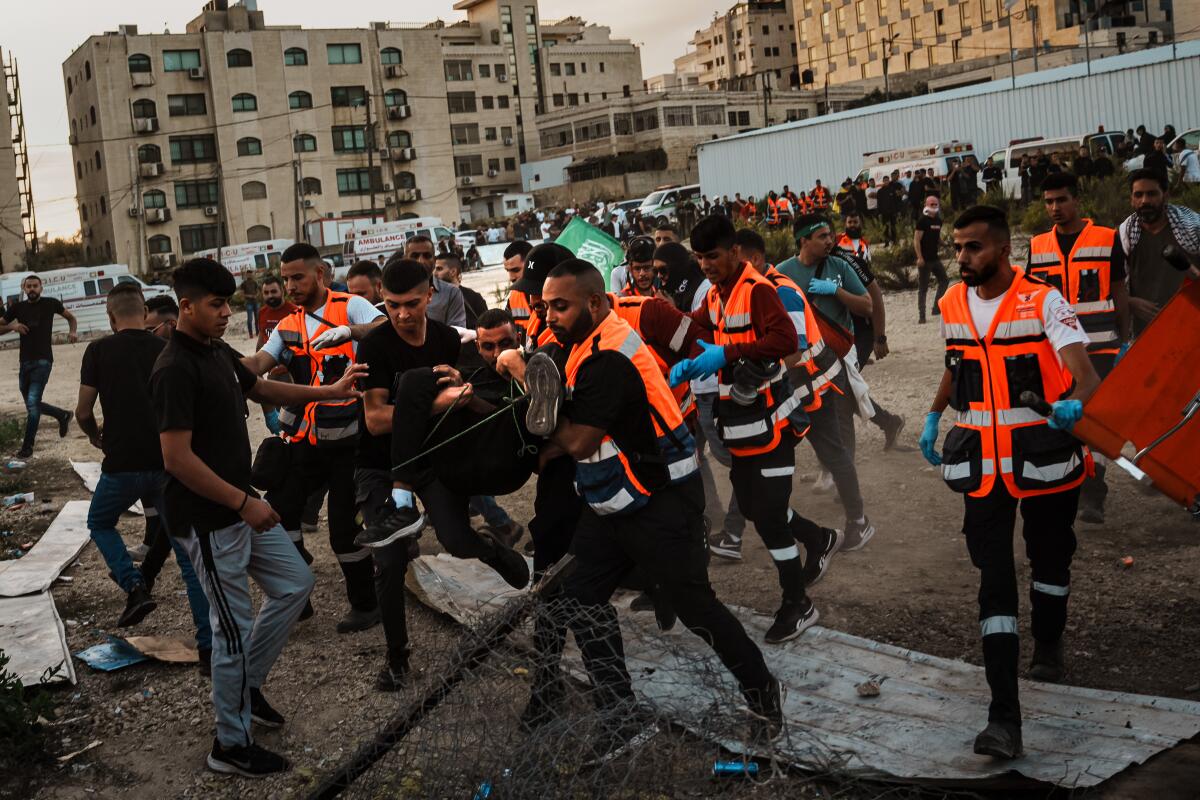
Paramedics carry a person who was shot by Israeli forces throughout an area Palestinian protest towards Israeli occupation in Ramallah, the West Financial institution, on Friday.
(Marcus Yam / Los Angeles Occasions)
Palestinian officers mentioned at the least 1,900 individuals had been killed in Gaza by late Friday, most by relentless airstrikes which have lowered complete neighborhoods to piles of rubble, filling the air with gritty grey plumes of mud and the ever-stronger scent of dying.
In part of the world the place biblical language usually finds its means into widespread speech, some individuals converse of the week’s occasions in passionate floods of verbiage. Others stutter out just a few phrases and fall abruptly silent.
Israel Attar, a 50-year-old Jerusalemite, rubbed his reddened eyes after burying his 23-year-old nephew, a military lieutenant who was killed within the first hours of the Hamas assault. Loss “is one thing that occurs right here,” he mentioned, however in some way, this previous week felt very completely different.
“Every little thing now,” he mentioned, “is black, black.”
::
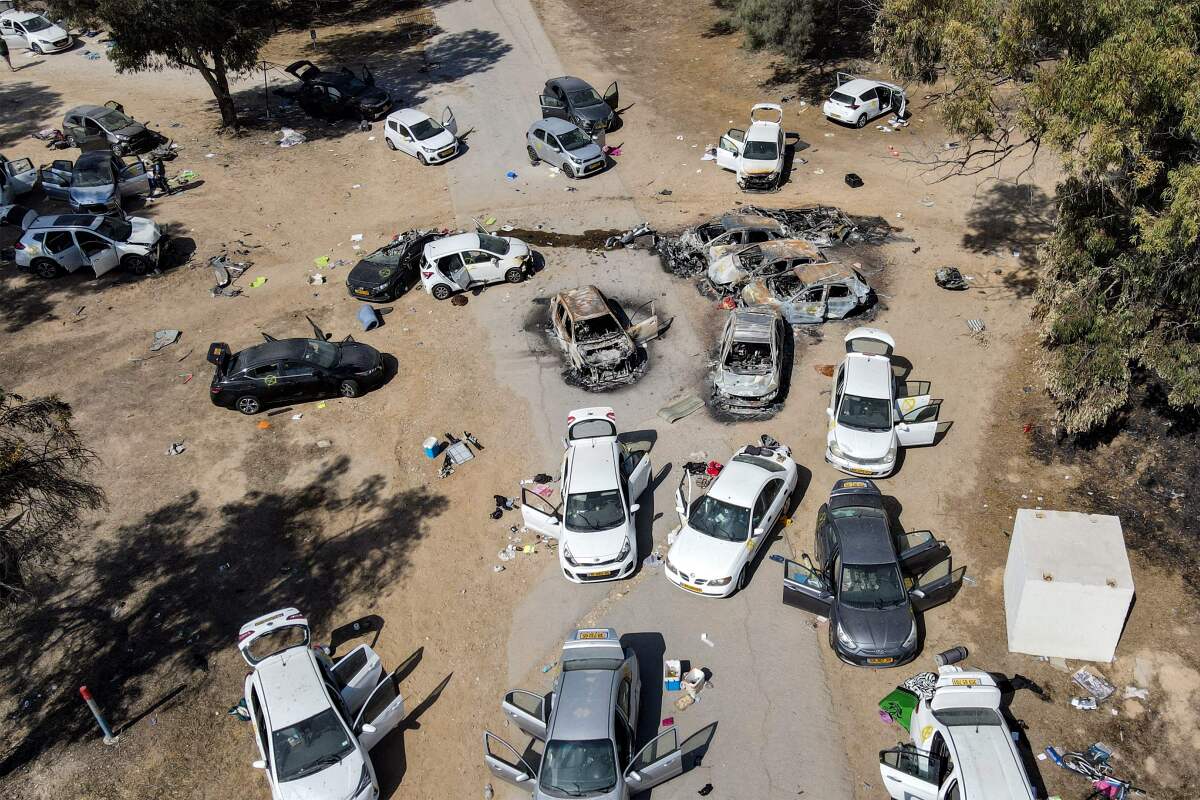
An aerial picture reveals deserted and torched automobiles on the website of the Oct. 7 assault on the Supernova desert music competition by Hamas militants close to Kibbutz Reim within the Negev desert in southern Israel on Oct. 13.
(Jack Guez / AFP through Getty Photos)
Amongst Israelis, the intelligence and operational failures that led to the wholesale slaughter of so many fellow residents produced an outpouring not solely of sorrow, however of rage — directed at Hamas, in fact, but additionally towards the already embattled authorities of Prime Minister Benjamin Netanyahu.
The prime minister and his far-right authorities have weathered months of huge protests towards a plan that critics say would hamstring Israel’s unbiased judiciary, amongst an array of different anti-democratic measures.
The energy of the Israeli safety institution has lengthy been a foundational article of social religion, and catastrophic vulnerabilities uncovered by Hamas attackers — who blinded digital surveillance with drones, breached a high-tech border fence with development tools and soared over the barrier on paragliders — are more likely to go away a generational scar, many observers say.
“We by no means imagined this might occur to us — we thought our military at all times protects us,” mentioned Odeya Harish, a 33-year-old criminologist from Jerusalem. She was a part of a pal group attending one funeral after one other — some for younger troopers, some for the younger revelers gunned down on the doomed desert rave close to Gaza.
Many have likened the shock to that of the conflict in 1973, however with essential variations. Half a century in the past, Israel was caught off-guard by an assault by a coalition of Arab states led by Egypt and Syria that additionally unfolded on a Jewish vacation — Yom Kippur, essentially the most sacred day of the Jewish calendar.
“Within the Yom Kippur Battle, we fought towards state armies. The conflict was alongside battle traces, and troopers fought to defend civilians at house,” mentioned analyst Kobi Michael of the Institute for Nationwide Safety Research. “This wasn’t the state of affairs right here — right here, the civilians have been the entrance line.”
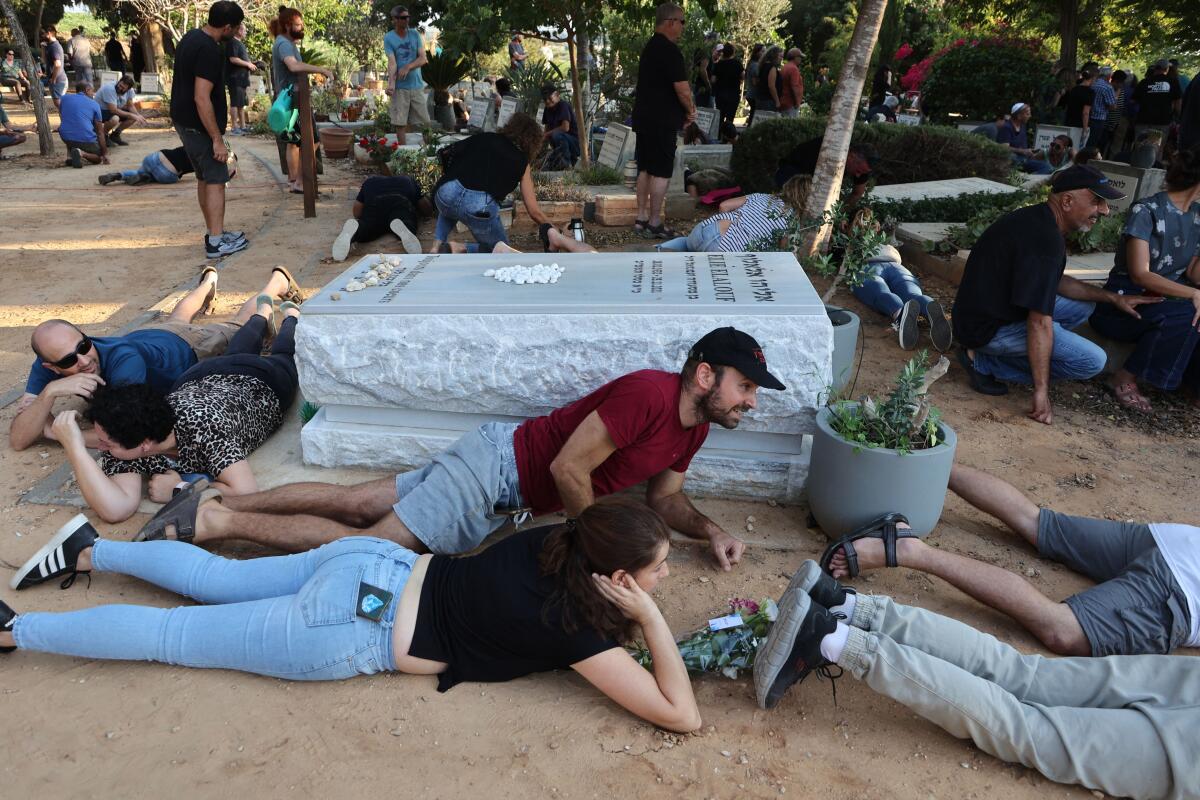
Mourners duck for canopy upon listening to sirens warning of incoming rockets in the course of the a funeral for a person killed close to Tel Aviv in the course of the Hamas assault.
(Gil Cohen-MAgen/ AFP through Getty Photos)
With few Israeli households left untouched by the carnage — both by having associates or family members useless or lacking, or through their younger and middle-aged males becoming a member of the 360,000-strong callup of reserves — a wide-ranging reckoning over how Hamas was capable of plan and execute such a posh assault is undoubtedly coming.
However not now, the nation’s military chief advised at a briefing this week.
The Israeli army “is accountable for the safety of the state and its civilians, and this previous Saturday we didn’t obtain this,” mentioned the military chief of workers, Lt. Gen. Herzi Halevi. “We’ll be taught and analyze what occurred, however now — it’s a time of conflict.”
Many Israelis, nevertheless, forged the blame much less on army brass than on essentially the most senior political echelons, together with Netanyahu, saying his efforts to cling to energy had proved a deadly distraction.
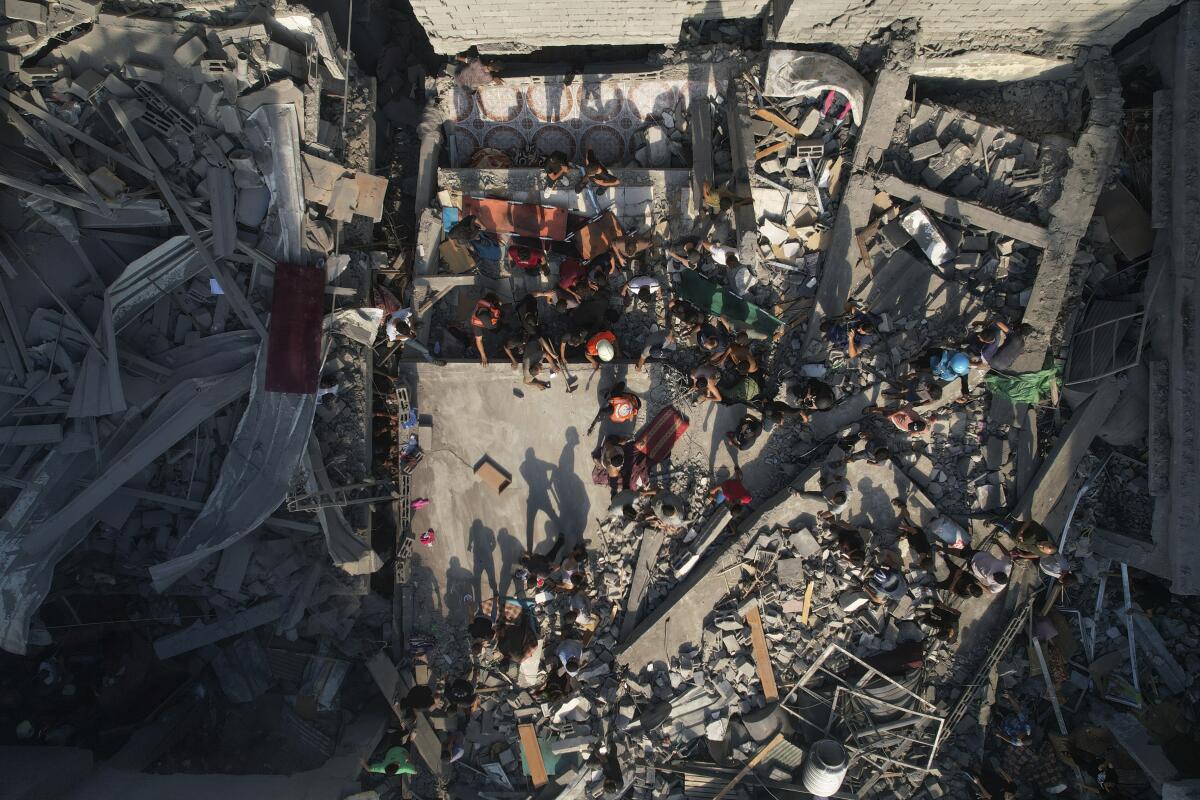
Palestinians examine the rubble of buildings hit by an Israeli airstrike at Al Shati refugee camp.
(Hatem Moussa / Related Press)
For Palestinians, this conflict’s political backdrop can be sophisticated. Hamas, which has denounced Israel’s existence, has held management over Gaza for greater than 15 years, and whereas few Palestinians would dare to talk brazenly towards the group, non-public conversations are likely to mirror deep disillusionment with its rule.
Israel is universally blamed by Palestinians for determined humanitarian circumstances and punishing mass confinement inside Gaza. However as a lot as Hamas is disliked, opinion polls final 12 months advised it was gaining floor on the Palestinian Authority, which is scorned as previous and corrupt in its governance of the West Financial institution, though different political figures are extra in style than both.
Inside Israel correct, Palestinians and different Arabs make up a full one-fifth of the nation’s 10 million residents, and because the disaster has spiraled, many worry being scapegoated and attacked, simply as they’ve been throughout previous conflicts between Israel and Arab foes.
After Saturday’s assault within the south of Israel, a Bedouin tow-truck operator who was employed to cope with bullet-riddled automobiles deserted by fleeing civilians reported an disagreeable encounter with Israeli troops securing the world.
Though Hamas infiltrators have been suspected to nonetheless be energetic within the space, the driving force, an Israeli citizen named Zayid, mentioned he was not allowed to hold a weapon, as Jewish Israelis who arrived on the scene to assist have been allowed to do.
“The second one thing like this occurs,” he mentioned, “they begin us with suspicion.”
::
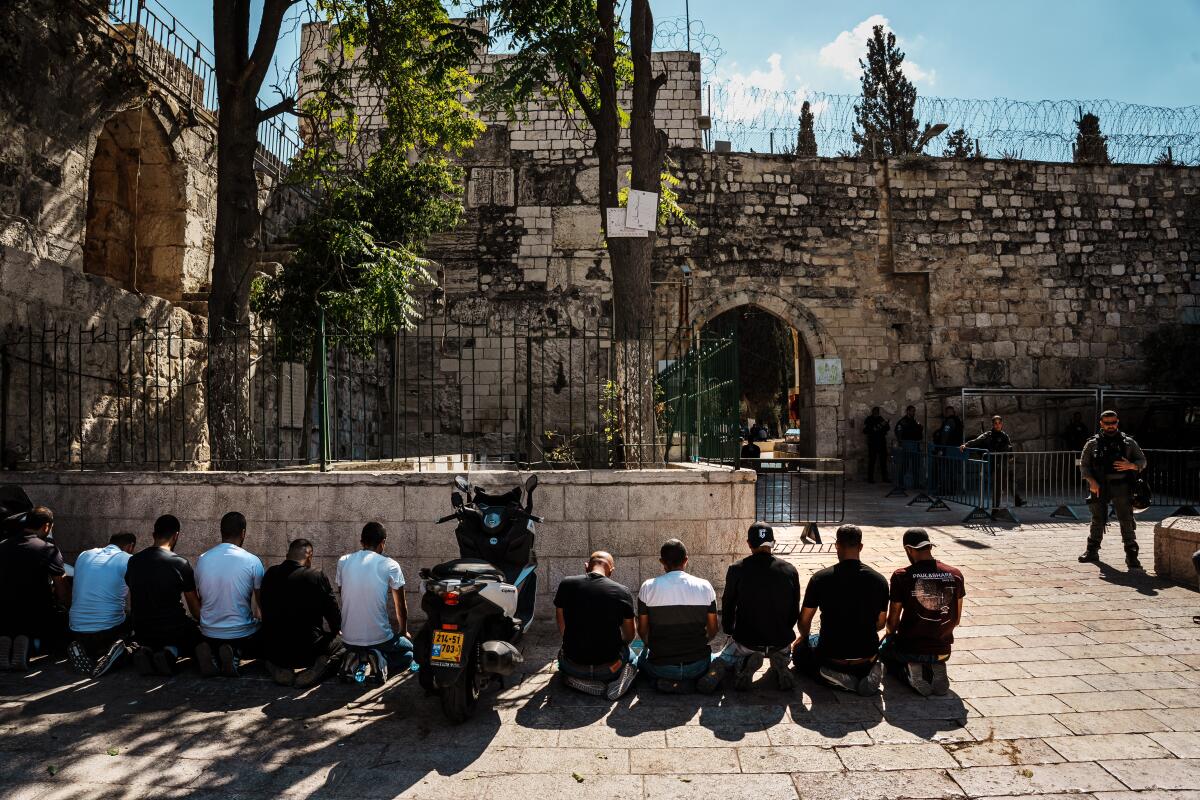
Younger males restricted from approaching Al Aqsa mosque, on the raised plateau above the Western Wall, pray within the Previous Metropolis of Jerusalem on Friday.
(Marcus Yam / Los Angeles Occasions)
In Jerusalem’s Previous Metropolis, the chimes of church bells mingled with the decision to Muslim prayer. On the Western Wall, Judaism’s second-holiest website, solely a smattering of worshipers could possibly be seen within the sun-scorched plaza at noon on Friday, hours earlier than the beginning of the Jewish Sabbath.
The walled Previous Metropolis is barely a 3rd of a sq. mile in dimension, and few locations evoke to a better extent the literal jostling of 1 Abrahamic religion towards one other. And few locations are extra emblematic of the fervor with which the trustworthy guard their traditions.
For some, the day’s non secular rituals have been a reminder of a painful temporal cleaving: the before-times, and the after. At this identical hour final week, the present confrontation, already the bloodiest but between Israel and Hamas, had not but begun.
Nehora Cohen, a rabbi’s spouse who got here to worship at noon, mentioned she had had a premonition weeks in the past that issues could be about to go horribly fallacious. She was on the Wall on Saturday, she mentioned, when air-raid sirens heralded the beginning of this conflict, and prayed, as at all times, for Israel’s security.
“Individuals are merely scared,” she mentioned, gesturing across the near-empty plaza, guarded on all sides by closely armed Israeli forces.
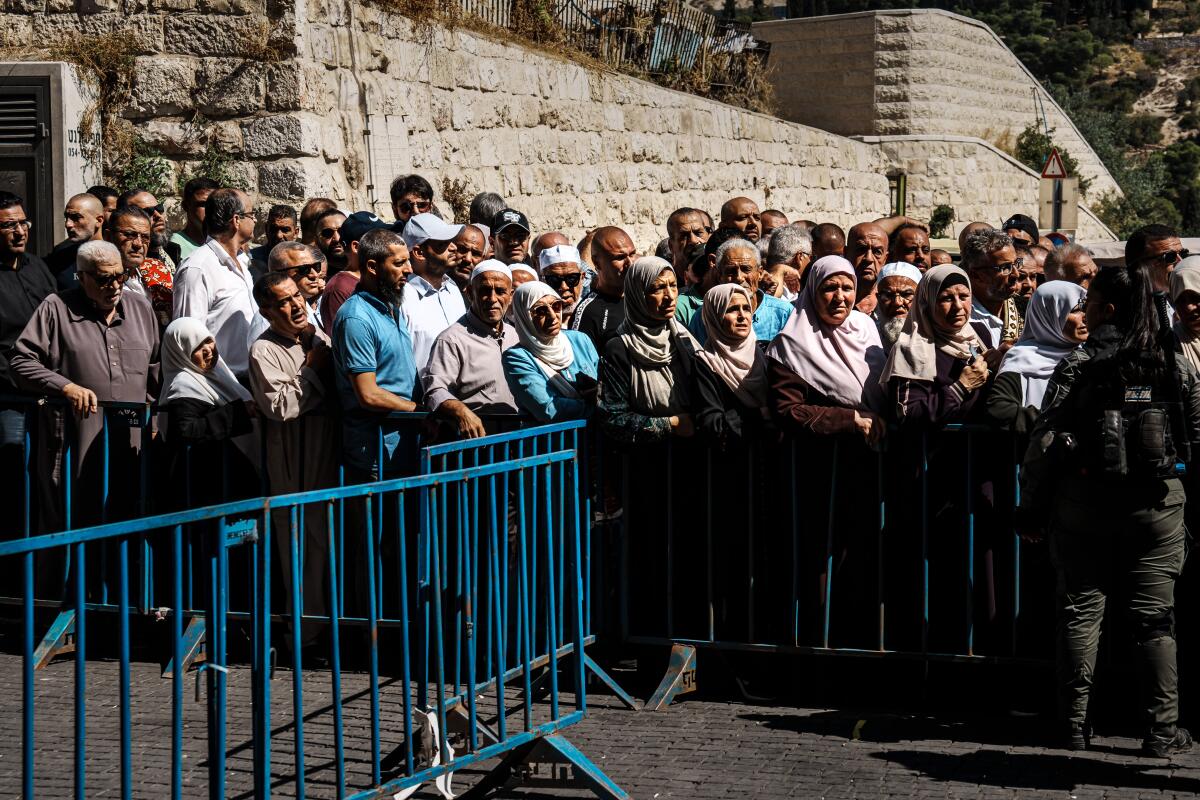
Folks wait in line to get previous safety checkpoints to attend Friday prayers in Jerusalem’s Previous Metropolis.
(Marcus Yam / Los Angeles Occasions)
Close by, Muslim worshipers braved a ferociously sizzling solar to succeed in the Lion’s Gate, resulting in the Previous Metropolis’s Muslim Quarter. Israeli police enforced tight restrictions on these allowed to enter Al Aqsa mosque, on the raised plateau above the Western Wall.
To the shock of many, together with some worshipers, prayers handed peacefully regardless of calls from Hamas for a “day of rage” over the battle.
Some worshipers deplored Hamas’ focusing on of civilians, however mentioned the world had ignored Gaza’s sufferings.
“See this cat?” mentioned mosque-goer Khaled Basem, 55. “It has extra rights than a Palestinian proper now.”
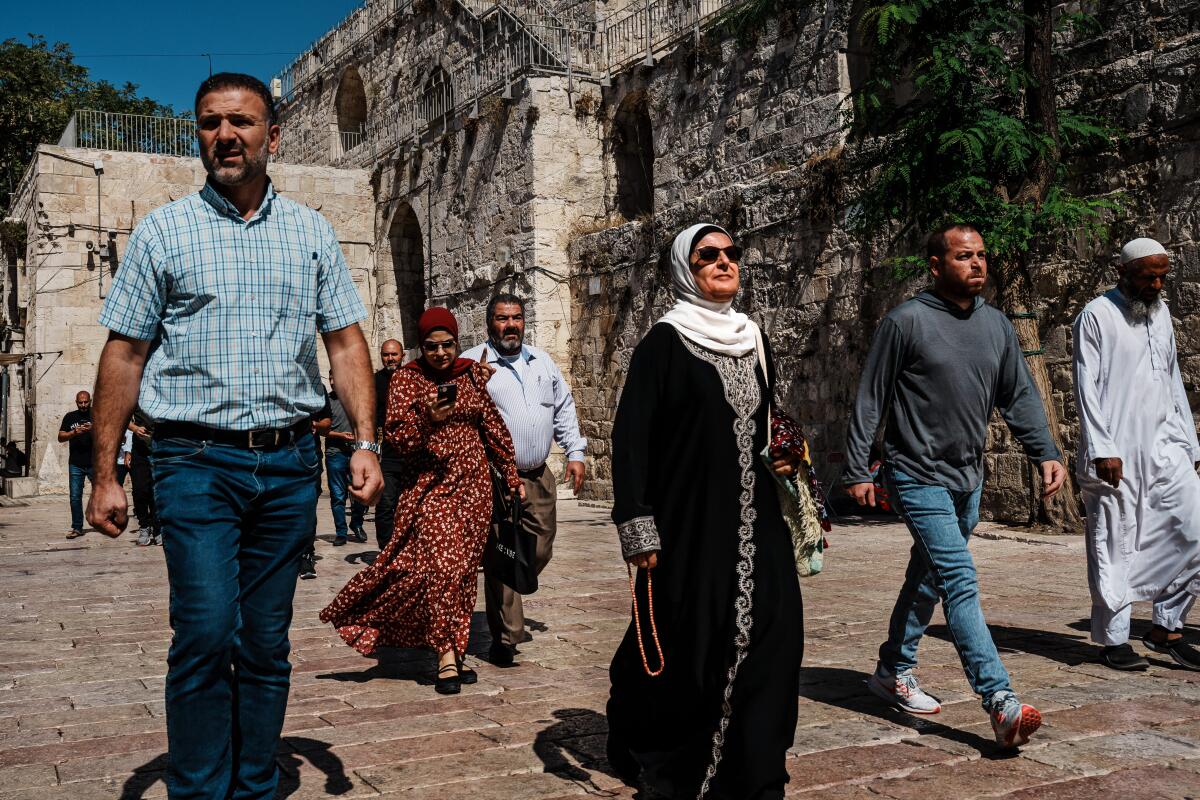
To the shock of many, together with some worshipers, Friday prayers handed peacefully in Jerusalem’s Previous Metropolis regardless of calls from Hamas for a “day of rage” over the battle.
(Marcus Yam / Los Angeles Occasions)
Inside, the imam known as for God’s assist in defending what he known as Gaza’s dignity. As congregants shuffled out, there was a momentary fracas close to Lion’s Gate. Then quiet.
A 40-year-old named Yaqoub mentioned he had hoped for calm.
“We’re simply right here to hope,” he mentioned. “You wish to go battle, the place the battle is.”
Occasions particular correspondent Lidman reported from Tel Aviv.


